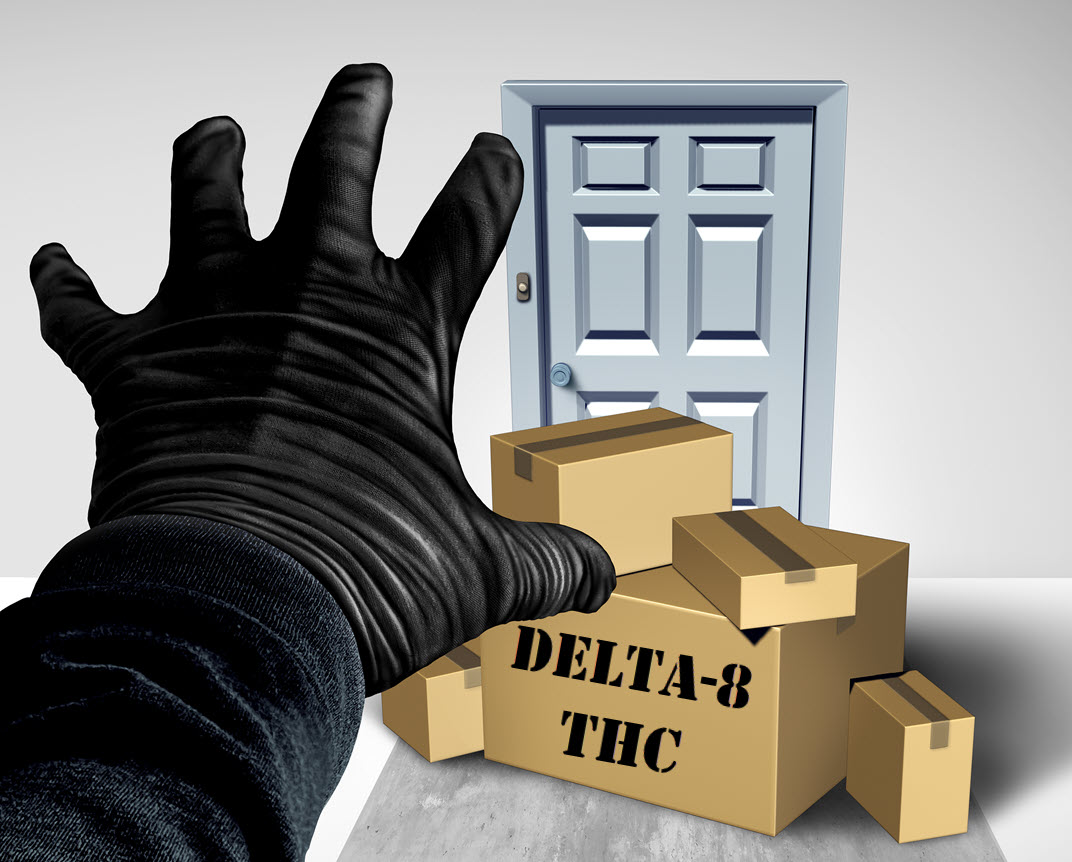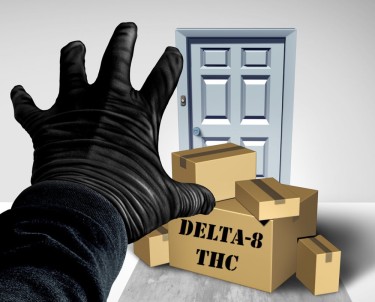Cannabis News
The End of the Hemp Industry? The DEA is Coming for Hemp-Derived Delta-8 THC, And Maybe More Synthetic Cannabinoids
Published
2 years agoon
By
admin

Your Corporate Political Overlords discuss the finer details on how they own you
Did you hear?
The DEA recently released their new updated “slaver’s agreement,” where your bodily autonomy gets violated and labeled a “crime” – in which you forgo your liberty under the 12th Amendment and become property of the state.
Their latest update comes in retaliation to the market’s “loophole”, Delta-8 THC.
Allow me to summarize an article originally published in Marijuana Moment.
The Drug Enforcement Administration (DEA) is at it again, my fellow cannabis enthusiasts. According to recent reports, the DEA is preparing to propose new rules that would classify synthetically manufactured cannabinoids, such as delta-8 THC, as prohibited controlled substances. Oh, joy!
During the agency’s Supply Chain Conference, Terrance Boos, the chief of the DEA’s Drug and Chemical Evaluation Section, revealed their plans to modify regulations on cannabis constituents based on recommendations from the U.S. Department of Health and Human Services (HHS). One proposed change is to “decontrol CBD up to 0.1 percent THC.” In other words, they want to loosen the grip on CBD slightly, but don’t get too excited—it’s a minuscule step in the right direction.
The intention behind these new rules, they claim, is to provide clarity and eliminate confusion surrounding the legal status of various cannabinoids. Since the federal legalization of hemp and its derivatives under the 2018 Farm Bill, the market for cannabis products has exploded. However, the emergence of intoxicating cannabinoids like delta-8 THC has caused quite the stir, prompting lawmakers in various states to scramble and create a chaotic patchwork of regulations for these products.
Here’s the thing, my friends: delta-8 THC does occur naturally in cannabis in trace amounts, and the DEA had previously confirmed that these natural constituents were uncontrolled. But hold on to your hats because they’re about to drop the hammer. The DEA wants to crack down on “synthetic delta-8 THC”, which is produced through a chemical process that converts CBD into this delightful compound.
They argue that synthetic tetrahydrocannabinols, like delta-8 THC, are not exempted from the Controlled Substances Act (CSA), unlike their naturally produced counterparts.
Basically, they just closed the “loophole” with the legal Delta 8 issue.
Now, let’s take a moment to appreciate the sheer brilliance of this move. The DEA, in their infinite wisdom, wants to tighten their grip on a compound that can be obtained naturally from the plant but is suddenly deemed dangerous when synthesized in a lab. It’s almost as if they’re determined to make our lives as difficult as possible while completely disregarding the scientific evidence and the will of the people.
But we know that the Controlled Substance Act never utilized Science or Reason at its core. We know that the CSA is merely a tool of the oppressors
But fear not, my dear readers, for the battle is not lost. The final rule from the DEA is yet to be unveiled, and we must remain vigilant and united in our fight for cannabis freedom. Additionally, there are potential changes on the horizon with the next iteration of the farm bill and President Biden’s review of marijuana scheduling. These developments could shape the landscape of cannabis regulation and have a profound impact on the industry.
However, when it comes to Biden and his ilk – I wouldn’t hold my breath. In fact, those guys are trying to set it up so that Pharma can get main control over the cannabis industry. This is because irrespective of their party colors – they all serve the same masters.
In the midst of this regulatory frenzy, it’s crucial to stay informed and engaged. Companies and individuals must pay attention and actively participate in the discussions surrounding these issues.
The lack of regulatory guidance from the Food and Drug Administration (FDA) only adds to the confusion. The FDA has yet to establish clear rules for hemp-derived CBD products, leaving companies and consumers in a state of limbo.But then again, this isn’t surprising either.
The FDA has the power to reschedule cannabis and provide much-needed regulatory clarity. But alas, they claim they lack the authority to do so without congressional support. Meanwhile, the DEA, who holds the keys to the rescheduling kingdom, insists on relying on the FDA’s scientific review before making any moves. It’s a never-ending loop of finger-pointing and bureaucratic inertia, leaving us stuck in a limbo of uncertainty. Oh, the joys of government bureaucracy at its finest!
This is also by design. It’s not an accident that the FDA – which is primarily funded by Pharma – somehow can’t seem to get the “safety profile” of cannabis after decades and decades of research. But magically, almost as if they were paid billions – they could fast track a vaccine that was not effective at stopping transmissions and empirically didn’t perform that much better than natural immunity.
But I digress.
While we brace ourselves for the DEA’s final rule on synthetic cannabinoids, we must remember that enforcement resources are limited. The FDA is likely to focus on public safety concerns and legality, as demonstrated by their joint enforcement action in Minnesota. The ultimate decision rests with the DEA, and we can only hope they’ll come to their senses and acknowledge the absurdity of their current stance.
So, my friends, let us stand together in defiance of the DEA’s attempts to stifle our freedom and enjoyment of cannabis. We must remain informed, engaged, and vocal in our opposition to these draconian regulations.
But let’s dive deeper into how this will impact the cannabis industry, especially in states that don’t have cannabis laws on the books.
How this change will impact legal THC?
Well, in a nutshell, the DEA has given themselves the power to go out and bust up any sales of Delta-8 that “isn’t natural”. How they will prove this is still to be decided, but essentially, you can expect them to conduct raids or at the very least send out “cease and desist” letters to those establishments that are currently selling it.
But that is only talking about the legal establishments. The real victims here are the people who need access to cannabis in prohibition states.
You see, Delta-8 THC, a cannabinoid derived from hemp, has been providing a legal avenue for individuals, including veterans and those suffering from chronic pain, to access the therapeutic benefits of cannabis without running afoul of strict state laws. It was a glimmer of hope, a ray of light in the darkness of prohibition.
But alas, the DEA, in their insatiable need to remain relevant and flex their authority, has decided to crush that hope.
By classifying Delta-8 THC as illegal, they have effectively cut off the legal option for those who rely on its medicinal properties. Once again, individuals in prohibition states are forced to go underground, to seek out illicit sources for their cannabis needs. It’s a tragic cycle, my friends, one that perpetuates the black market and denies people access to safe, regulated products.
The DEA’s decision is particularly disheartening because it disregards the growing acceptance and tolerance of adult drug use in our society.
As more and more states embrace cannabis legalization, it seems the DEA is desperately clinging to the vestiges of a bygone era. Instead of adapting to the changing times and acknowledging the potential benefits of cannabis, they choose to stifle progress and maintain their grip on power.
In doing so, the DEA not only undermines the rights of individuals to make informed choices about their own well-being but also perpetuates the harms of the black market. It’s a lose-lose situation, my friends.
Those in need of cannabis for medical purposes are left without legal options, and the black market thrives once again, with all its associated dangers and risks.
So, we find ourselves in a familiar position, caught in the crossfire of outdated policies and misguided attempts to control what people choose to put in their bodies.
It’s a frustrating reality, but one that only strengthens our resolve to advocate for sensible drug policies and the rights of individuals to access the substances that can improve their quality of life.
My dear friends, the time has come for a new conversation, a conversation that challenges the outdated notions surrounding drugs, drug use, and individual autonomy. We must question the hypocrisy that exists in our society, where we are allowed to consume unhealthy processed foods and poison ourselves with high-fructose garbage, but somehow lack the intelligence to make informed decisions about other substances.
It’s time to recognize that agencies tasked with protecting us from ourselves are unnecessary and often hinder progress. We should have the right to determine what we put into our bodies, as long as we are aware of the risks and benefits involved. The freedom to make choices about our own well-being should extend to all areas of consumption, not just those deemed acceptable by societal norms.
Let us be outspoken about these issues, my friends. Let us challenge those who cling to archaic ideas and stand in the way of progress. It is time to evolve beyond the restrictive mindset of the 1900s and embrace a future where individual autonomy is cherished and respected.
Together, let us advocate for a society that values personal freedom, informed decision-making, and the right of individuals to determine what is best for their own bodies. Only through open dialogue and a commitment to change can we pave the way for a more enlightened and compassionate approach to drugs and human rights.
So, my friends, let us raise our voices, challenge the status quo, and forge a path towards a future where the rights of individuals are paramount. The time for change is now, and together, we can create a society that truly embraces individual autonomy as a sacred right.
MORE ON THE DEA OVER-REACH, READ ON…
THE DEA IS COMING FOR DELTA-8 THC, HHC, AND HEMP-DERIVED PRODUCTS!
You may like
-


Cannabis Can Help A Sore Throat
-


Cannabis and the Authoritarian State
-


As cannabis consumer tastes evolve, industry must look beyond potency
-


Article: Early 2025 Empire State Psychedelic Policy Roundup
-


White House Finally Comments On Marijuana Industry
-


Stop Using Bat Poop to Fertilize Your Weed Plants Immediately, Here is Why…


Cannabis and the Authoritarian State
Cannabis has been legal for longer than it has been illegal. Let that sink in for a minute. For thousands of years, humans cultivated and consumed cannabis freely across civilizations and continents. It wasn’t until the early 1900s that we witnessed a massive push to drive hemp and cannabis into the black market, primarily due to industrial competition from petrochemicals, pharmaceuticals, and other industrial applications.
What makes cannabis so threatening to powerful interests? For starters, hemp and cannabis are highly versatile crops with over 50,000 different uses, from medicine to textiles to fuel. Even more remarkable is how this plant is hardwired to work with the human body through our endocannabinoid system—a biological network we didn’t even discover until the 1990s.
Perhaps most threatening of all is that cannabis is insanely easy to grow. This means that if the plant helps you with a particular physical ailment, you have the ability to grow your own medicine indefinitely. No insurance premiums, no wait lists, no pharmaceutical middlemen—just you cultivating your own healing directly from the earth.
Authoritarians do not like this, not one bit. When people can meet their own needs independently, power structures lose their grip. When citizens can think differently without permission, control systems begin to fail. So today, we’re going to look at the interesting relationship between authoritarianism and cannabis, and how this humble plant plays a key role in keeping you free.
We’ve already established the versatility of cannabis, but there’s another element that those old D.A.R.E. PSAs inadvertently reveal about what authoritarians think about cannabis. I’m talking, of course, about “behavior.” You see, in an authoritarian system, you and I are but cogs in the machine. We’re the expendables who should be proud to work ourselves to death for our “fearless leaders.”
This is precisely why certain ideas, philosophies, religions, movements, books, and substances are typically banned in authoritarian regimes. Take North Korea as an example: everything from the type of television citizens watch to the music they hear is a tightly spun spell designed to keep the populace in check. While they don’t have explicit laws against hemp (they actually grow it industrially), smoking psychoactive cannabis is strictly forbidden.
Contrast this with places like Malaysia, where you can get up to 5 years for possessing just 20 grams of cannabis, and even face the death penalty depending on the situation. These authoritarians don’t play around when it comes to cannabis because they know it affects the behavior of their populace in ways they can’t control.
The question becomes: what behavior do they fear so much that cannabis produces within the individual?
The answer is a critical mind. People who consume cannabis often begin to question their own belief systems. Most regular users undergo some transformation in their values and perspectives. Cannabis has a unique way of helping people see beyond cultural programming and think outside established paradigms. It can make the familiar strange and the strange familiar—a psychological state that’s antithetical to authoritarian control.
This independent thinking runs counter to the narrative of authoritarians who wish to maintain a tight grip on social consciousness. If even 10% of a population begins to pivot in their behavior within a regime, it can have massive ripple effects. Just look at cannabis in the US—it went from being demonized to being embraced by the majority in less than 80 years, despite massive propaganda efforts.
For authoritarians, psychoactive cannabis isn’t primarily a threat to public health and wellbeing—it’s a threat to the health and wellbeing of authoritarianism itself. When people start thinking differently, they start living differently. When they start living differently, they start demanding different. And that’s the beginning of the end for any system built on unquestioning obedience.
Beyond the threat to thought control, there’s another reason why drugs in general remain illegal: the state can use prohibition as a weapon against the populace. This isn’t conspiracy theory—it’s documented history.
Take Nixon’s war on drugs. His domestic policy chief, John Ehrlichman, later admitted: “We knew we couldn’t make it illegal to be either against the war or black, but by getting the public to associate the hippies with marijuana and blacks with heroin, and then criminalizing both heavily, we could disrupt those communities.” Nixon essentially placed cannabis on the Controlled Substances Act because he needed an excuse to shut down anti-war protests and target Black communities.
Since hippies and anti-war protesters were smoking “freedom grass,” making it illegal would circumvent their freedom of speech and freedom of assembly, and more importantly—turn free citizens into state property. It’s a win-win if you’re an authoritarian looking to silence dissent.
Then there’s the whole “boogeyman” complex that prohibition creates. We’re told “drug dealers” are roaming the streets preying on innocents, giving them “marihuanas” so they can do vile things. What the government conveniently leaves out is how the banks these “dealers” use to launder their money remain untouched. They don’t mention the shadier dealings of law enforcement either—like running guns into Mexico (eventually leading to the death of one of their own), or spraying poison on crops, killing and hospitalizing people because, you know…”Drugs are bad!”
Authoritarians cannot let go of the value that keeping the most widely used illicit substance in the world illegal provides them. This explains why the US hasn’t federally legalized cannabis despite nearly 80% of Americans supporting some form of legalization. It’s not because they don’t have enough research or that they’re genuinely concerned about public health—it’s because prohibition gives them all the privileges of violating constitutional rights while siphoning money into their coffers.
Drug prohibition creates a perpetual enemy that can never be defeated, allowing endless justification for surveillance, militarized police, asset forfeiture, and expansion of state power. What authoritarian could resist such a convenient tool?
Cannabis is a plant. You can’t make nature illegal—it’s counter to the human experience. When governments attempt to criminalize a naturally occurring organism that humans have cultivated and used for thousands of years, they reveal the absurdity of their position and the limits of their authority.
While the United States isn’t a full-on authoritarian state (yet), the truth is that many authoritarian elements have played out over the years. You only need to look as far as the war on drugs to see how the state utilizes prohibition as a weapon to their advantage. From no-knock raids to civil asset forfeiture to mass incarceration, drug laws have erected a parallel legal system where constitutional protections often don’t apply.
The fundamental truth is that cannabis is not only versatile and medicinal, it gives you back your autonomy in multiple ways. It helps you think for yourself. It allows you to grow your own medicine. It connects you with a plant that humans have used ceremonially, medicinally, and industrially throughout our history. And this autonomy is something authoritarians cannot stand—free individuals who know how to think beyond the narratives they’re fed.
Cannabis doesn’t just get you high—it offers a perspective from which the absurdities of prohibition become glaringly obvious. Perhaps this is why, as state after state legalizes, we’re witnessing the slow but steady unraveling of one of the most enduring authoritarian policies in American history.
So if you count yourself among those who value freedom of thought and bodily autonomy, who believe that nature doesn’t require government permission, and who understand that true liberty includes the right to explore your own consciousness—well, maybe it’s time to toke one up for freedom!
LEGALIZING CANNABIS IS NOT ENOUGH, READ ON..
Cannabis News
Stop Using Bat Poop to Fertilize Your Weed Plants Immediately, Here is Why…
Published
2 days agoon
April 1, 2025By
admin

Don’t Fertilize Your Weed with Bat Poop
Fertilization is a critical step for growing healthy marijuana plants.
They help provide essential nutrients for marijuana in various stages of growth, while promoting plant growth. There are dozens of different fertilizers to choose from in the market; growers can choose based on budget, nutrients needed, location, season, and much more. But not all fertilizers are made equally – of course, some are of better quality than others.
That said, there are some rather unusual fertilizers that can be used on plants. These may include, but are not limited to: coffee, milk, grass clippings, banana peels, fish tank water, potato water, and even urine! Yes, it does sound strange, but to gardening enthusiasts, there is nutritional value to be found in each of these things, which can make them suitable fertilizers depending on the circumstances.
For example, grass clippings make excellent mulch and can provide potassium, nitrogen, and phosphorus. Urine is a potent source of nitrogen as well as phosphorus. Banana peels are rich in calcium, which is excellent for promoting root growth while helping supply oxygen to the soil.
But what about bat poop? Also known as guano, bat poop has been said to work as a plant fertilizer because it’s rich in nitrogen, potassium, phosphorus, and other nutrients. Unfortunately, using bat poop as a plant fertilizer can also be dangerous. So if you don’t really know what you are doing, bat poop as a fertilizer can be extremely risky.
Bat Poop Fertilizer Kills 2 NY Men
On December 2024, news of two men hailing from Rochester, New York, dying went viral.
The cause of death was dangerous fungus, in the bat poop that they were using to fertilize their marijuana plants. Both men grew their own marijuana plants for medical consumption, but unfortunately developed histoplasmosis after breathing toxic fungal spores from the guano.
One of the men was aged 59 years old; he bought bat poop online to use as fertilizer for his plants. Meanwhile, the other was a 64-year-old male who found guano in his attic, then decided to use it to fertilize his cannabis plants. They both developed similar symptoms, including chronic coughs, fever, severe weight loss, and respiratory failure. The case was also discussed in the Open Forum Infectious Diseases medical journal.
Is there a safe way to use bat poop as fertilizer? If you ask me, I truly can’t understand why one would use guano as fertilizer when there are so many other proven safe alternatives out there that are simply not as risky. According to the University of Washington, one must always wear a dust mask each time you open a bag containing soil amendments. That’s because a mask will greatly decrease the chances of breathing in fungal spores, which could be potentially dangerous. They also go on to explain that yes, guano is indeed used as fertilizer for its valuable nitrogen content but it still isn’t without its own risks, particularly of developing Histoplasma – the same condition that killed the two men.
Make Your Own Safe Fertilizers At Home
There are many other safe, affordable – and even free – fertilizers you can feed your marijuana plants with. It doesn’t have to cost a fortune nor does it have to be risky to your health.
Check out these easy, low-cost, DIY fertilizers for weed:
-
Coffee grounds are abundant in nitrogen, which makes it perfect for the vegetative stage of marijuana plants. They are also a fantastic source of organic materials and green waste, which contain other vital nutrients. When the coffee grounds decompose, they create soil aggregates that improve soil aeration and its water retention capabilities.
Mix around 2 grams of coffee ground for every liter of soil. Measuring its pH levels is also helpful, since you want it to be between 6 to 6.5
-
Crushed eggshells are a great way to ensure no eggshells go to waste. It’s rich in calcium plus other minerals that are effective in improving overall plant structure, health, and growth. In fact, so many gardeners and farmers commonly use crushed eggshells to help boost plant growth – and it will work just as well for marijuana plants.
They’re really easy to use, too! Just mix eggshells into the soil, or steep them into water then pour into the soil for a calcium-packed feed.
-
Banana tea or water is rich in potassium and magnesium, making it perfect as a feed during the marijuana plant’s flowering stage. You can use banana peels differently: with 3 to 5 banana peels, soak it in water for 2 days. Then you can use the water on your plants, and even leave the banana peels as compost for your garden.
-
Wood ash from your fireplace or other sources is a great source of phosphorus and potassium. Simply sprinkle some wood ash over marijuana during the final flower phase. Just use 1 or 2 grams of ash for every liter of substrate. Be careful not to use too much wood ash, or it can make the soil too alkaline.
-
Animal manure, such as those from cows, rabbits, or horses, make excellent organic fertilizers. Just be sure that they’re composed properly so that you avoid introducing weed seeds, or pathogens.
These low-cost fertilizers are also natural and effective. There’s no reason for you to turn to bat poop as fertilizer, even if you’re in a bind.
Conclusion
Guano or bat poop is a poor choice of fertilizer if you don’t know what you are doing. It’s risky and potentially dangerous – just not worth it. Instead, fertilize your marijuana plants with these options mentioned.
BEST POOP FOR CANNABIS PLANTS, KEEP READING…
Cannabis News
Getting THC Edibles in Your Edible Arrangement?
Published
4 days agoon
March 30, 2025By
admin

Edible Arrangements Leans into Intoxicating Hemp Products: A Strategic Expansion
Edible Arrangements, a brand renowned for its vibrant fruit bouquets and sweet treats, is embarking on a bold new venture into the hemp and THC-infused edibles market. Through its parent company, Edible Brands, the company has launched Edibles.com, an e-commerce platform offering a variety of hemp-based products such as THC-infused beverages, gummies, and snacks. This strategic move taps into the burgeoning demand for cannabis-related wellness products and reflects a deliberate expansion beyond traditional offerings.
Introduction to Edible Arrangements and Its New Venture
Edible Arrangements was founded in 1999 by Tariq Farid, who envisioned a unique way to gift fresh fruit arrangements that were both visually appealing and delicious. Over the years, the company has grown to become a global brand with hundreds of locations across the United States and internationally. However, the company’s latest initiative marks a significant departure from its traditional fruit-based offerings, signaling a broader strategic shift towards becoming a comprehensive food, health, and wellness company.
The New Venture: Edibles.com
Edibles.com debuted on March 20, 2025, starting operations in Texas with ambitious plans to expand rapidly across Southeastern states like Florida and Georgia. The platform is designed to cater to consumers aged 21 and older, providing low-dose THC products that comply with the 2018 Farm Bill, which legalized hemp containing less than 0.3% THC by dry weight. Select products will also be available for nationwide shipping where legally permitted, leveraging the company’s existing logistics infrastructure.
Product Lineup
The initial product lineup includes a range of THC-infused beverages, gummies, and snacks. These products are designed to appeal to both seasoned cannabis users and newcomers looking for low-dose, accessible options. The company emphasizes the importance of quality and safety, ensuring that all products undergo rigorous testing to meet high standards of purity and potency.
Strategic Alignment and Market Potential
The move into the infused edibles market aligns with Edible Brands’ vision of becoming a broader food, health, and wellness company. CEO Somia Farid Silber highlighted that the infused edibles market is a fast-growing sector with high consumer demand for safe and reliable products. The company is leveraging its extensive franchise network to deliver these items while planning to open brick-and-mortar stores under the Incredible Edibles brand.
Market Trends and Consumer Demand
The cannabis industry, particularly the segment focused on hemp and THC-infused products, has seen exponential growth in recent years. This growth is driven by increasing consumer interest in wellness and recreational products, as well as evolving legal landscapes that have opened up new markets. Edible Arrangements is positioning itself to capitalize on this trend by offering products that cater to both health-conscious consumers and those seeking unique gifting options.
Challenges and Opportunities
While this expansion offers significant growth potential, it also comes with challenges such as navigating varying state regulations and ensuring product safety and quality. The company aims to address these issues through robust infrastructure and consumer advocacy. Thomas Winstanley, a cannabis industry veteran leading Edibles.com, emphasized the company’s unique position to drive innovation in this emerging market.
Regulatory Challenges
One of the primary challenges facing Edible Arrangements is the complex regulatory environment surrounding cannabis products. Laws regarding the sale and distribution of THC-infused products vary significantly from state to state, requiring the company to adapt its operations to comply with local regulations. This includes ensuring that products meet specific THC content limits and are marketed responsibly.
Quality Control and Safety
Another critical challenge is maintaining high standards of quality and safety across all products. Edible Arrangements is investing heavily in testing and quality assurance processes to ensure that all products meet stringent safety standards. This includes partnering with reputable suppliers and implementing rigorous testing protocols to verify the potency and purity of all THC-infused items.
Consumer Education and Advocacy
As part of its strategy, Edible Arrangements is also focusing on consumer education and advocacy. The company recognizes that many consumers are new to cannabis products and may have questions about usage, dosage, and safety. To address this, Edibles.com will provide comprehensive product information, dosage guidelines, and resources for consumers to learn more about the benefits and risks associated with THC-infused products.
Marketing Strategy
Edible Arrangements plans to leverage its existing brand recognition and customer loyalty to promote its new line of hemp-based products. The company will utilize social media, email marketing, and targeted advertising to reach its target audience. Additionally, partnerships with influencers and cannabis industry experts will help build credibility and drive awareness about the brand’s entry into this new market.
Future Expansion Plans
In the coming months, Edible Arrangements plans to expand its operations beyond Texas, targeting key markets in the Southeast. The company is also exploring opportunities to open physical stores under the Incredible Edibles brand, which will offer a curated selection of THC-infused products alongside traditional Edible Arrangements items.
Incredible Edibles Stores
The Incredible Edibles stores will serve as a unique retail experience, combining the company’s traditional fruit arrangements with its new line of hemp-based products. This format will allow customers to explore and purchase THC-infused items in a welcoming and educational environment. The stores will also host workshops and events focused on cannabis education and wellness, further enhancing the brand’s position as a leader in this emerging market.
Conclusion
Edible Arrangements’ foray into the hemp and THC-infused edibles market marks a significant strategic shift for the company. By leveraging its brand recognition and logistical capabilities, Edible Arrangements is poised to become a major player in this rapidly growing sector. While challenges exist, the company’s commitment to quality, safety, and consumer education positions it well for success in this new venture.
As the cannabis industry continues to evolve, Edible Arrangements’ entry into this market underscores the broader trend of mainstream brands embracing cannabis-related products. This move not only expands the company’s offerings but also reflects a broader cultural shift towards greater acceptance and normalization of cannabis use.
HEMP-DERIVED THC DELIVERIES ARE HERE, READ ON…

Cannabis Can Help A Sore Throat

Cannabis and the Authoritarian State

As cannabis consumer tastes evolve, industry must look beyond potency

Article: Early 2025 Empire State Psychedelic Policy Roundup

White House Finally Comments On Marijuana Industry

Stop Using Bat Poop to Fertilize Your Weed Plants Immediately, Here is Why…

The History Behind April Fool’s Day

Star signs and cannabis strains: April 2025 horoscopes

Does Comfort Food Actually Help

Connect to cannabis history with three legacy strains from Paradise Seeds

Distressed Cannabis Business Takeaways – Canna Law Blog™

United States: Alex Malyshev And Melinda Fellner Discuss The Intersection Of Tax And Cannabis In New Video Series – Part VI: Licensing (Video)

What you Need to Know

Drug Testing for Marijuana – The Joint Blog

NCIA Write About Their Equity Scholarship Program

It has been a wild news week – here’s how CBD and weed can help you relax

Cannabis, alcohol firm SNDL loses CA$372.4 million in 2022

A new April 20 cannabis contest includes a $40,000 purse

Your Go-To Source for Cannabis Logos and Designs

UArizona launches online cannabis compliance online course
Trending
-

 Cannabis News2 years ago
Cannabis News2 years agoDistressed Cannabis Business Takeaways – Canna Law Blog™
-

 One-Hit Wonders2 years ago
One-Hit Wonders2 years agoUnited States: Alex Malyshev And Melinda Fellner Discuss The Intersection Of Tax And Cannabis In New Video Series – Part VI: Licensing (Video)
-

 Cannabis 1012 years ago
Cannabis 1012 years agoWhat you Need to Know
-

 drug testing1 year ago
drug testing1 year agoDrug Testing for Marijuana – The Joint Blog
-

 Education2 years ago
Education2 years agoNCIA Write About Their Equity Scholarship Program
-

 Cannabis2 years ago
Cannabis2 years agoIt has been a wild news week – here’s how CBD and weed can help you relax
-

 Marijuana Business Daily2 years ago
Marijuana Business Daily2 years agoCannabis, alcohol firm SNDL loses CA$372.4 million in 2022
-

 California2 years ago
California2 years agoA new April 20 cannabis contest includes a $40,000 purse







